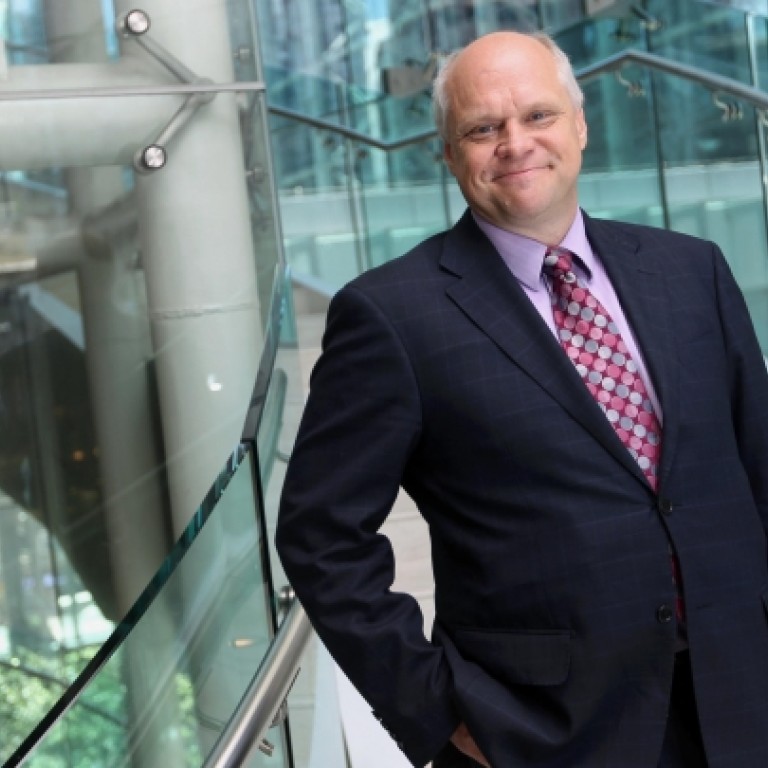
Adding value key to avoiding an ill wind
Overseas firms can hit problems when they link with mainland companies, but Finnish turbine component supplier believes it has the answer
For foreign technology firms, production and sales partnerships on the mainland can be a blessing and a curse.

Switch, a Finnish maker of permanent magnet generators and converters, which are key parts in wind turbines, says the solution to the conundrum is to keep bringing value to the partnerships.
Jukka-Pekka Makinen, the firm's chief executive, said: "The key is adding value. [Our partners] are like big bears. They need to eat meat, but they also need some balls to juggle."
He was referring to Switch's double roles in providing design and engineering help to mainland turbine makers so that their products are reliable, efficient and low-maintenance, and selling their products overseas.
"We need to be agile and position ourselves according to [their] different strategic needs," Makinen said.
The mainland has been the world's largest wind turbine market since 2010, but its producers are relative newcomers. Although they only set up production lines about eight years ago, four mainland makers ranked among the world's 10 biggest producers by market share in 2011.
While government financing support and low manufacturing costs helped them zoom into mass production rapidly, they relied on foreign partners for help with product design and the supply of key components.
Xinjiang Goldwind Science & Technology, the mainland's second-largest wind turbine maker, and the world's third-largest, had a German partner, Vensys, which it bought in 2008.
Sinovel Wind Group, the mainland's largest and the world's second-largest turbine producer, teamed up in 2005 with the US firm American Superconductor (AMSC), which helped the Beijing-based firm develop products and supplied core components.
The partnership broke down in 2011 when AMSC filed several lawsuits against Sinovel on the mainland for alleged illegal use of its intellectual property.
The US Department of Justice charged Sinovel, two of its employees and a former AMSC employee last month with intellectual property theft that allegedly cost AMSC US$800 million.

"The magnets are made in China, the labour costs are lower, and the market is here, we have to be in China," he said. "[Dongfang Electric] invested in a 70,000 square metre factory for us. We didn't have that kind of money.
Switch has its own factory in Luan, Anhui province, that makes converters, and sub-contracting relationships with factories in Hangzhou for converters and in Deyang, Sichuan, for permanent magnet generators.
The Deyang facility is owned by state-backed Dongfang Electric, one of China's three largest power generation equipment makers.
Generators turn wind energy into electricity, while converters regulate the variable power output from the turbines so that it meets standards required by power distributors to ensure stability of the power grid.
Asked if he was concerned that Switch's partners might steal its intellectual property, Makinen said: "If they screw us, we take our stuff elsewhere. We still own the drawings and designs.
"We have to trust our strategy: that means we have to trust our partners. We have to provide something they don't have, like the latest technology for big-capacity generators, and export sales channels and customers."
Under its agreement with Dongfang, Switch has exclusive rights to sell Dongfang's turbines overseas. A joint sales team takes care of domestic sales, with Dongfang focusing on state enterprises while Switch tackles foreign and private firms.
Switch was formed in 2006 through the merger of three firms that make converters and electrical machines, and is backed by a venture capital fund and a Finnish government start-up fund.
About half its sales are to the mainland, 40 per cent to Europe and 10 per cent to the Americas.
Switch's board had considered an initial public offering in Hong Kong to provide an exit for its investors, before it signed a deal to sell the firm to AMSC for €190 million (HK$1.92 billion) in 2011. But the sale was called off after Sinovel's alleged intellectual property theft and failure to take delivery of parts from AMSC.
Makinen did not rule out an initial public offering in Hong Kong when industry and stock market conditions improve. Switch booked a loss before interest and tax of €8.8 million last year on revenue of €43.2 million, down from a profit of €16.6 million on €134.6 million in 2010.
Makinen said he expected a turnaround this year after Beijing in May allowed local governments to resume approvals of new wind farms.

